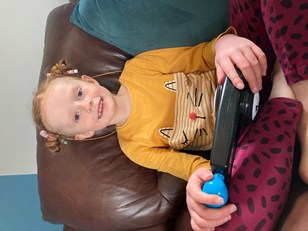Going to a birthday party
Published Date: 03 Jun 2021
Now that we can begin to meet in bigger groups again, birthday parties are back and it's reminded me of some of the problems deaf children can face.
We encountered several problems with parties in large church halls with music, kids and bouncy castles. Charlotte would become very clingy to me, cry and refuse to go and play with her friends. We left lots of these parties early and it took us a long time to realise that the noise was the problem.
The main difficulty in these large social groups is the immense background noise, whether indoors or outdoors, which can be overwhelming for deaf kids. Also they might not be able to hear announcements or instructions from adults running the parties.
We try to suggest that parents always use the deaf child's name first so that they know they have their attention before they start giving out instructions. Often they also ask her to come to them to listen to the instructions as well.
During all of these situations, it's really important that your child feels comfortable. We have special quieter programming in Charlotte's cochlear implants that she can choose if the situation is just too loud for her. But we have found that what works best for Charlotte, is allowing her to take her processors off altogether if she feels more comfortable. She often chooses to go to Christmas and birthday parties, particularly those with bouncy castles, in large halls or with loud disco music, without her 'ears' on so that she can play away without the sound annoying her. For these reasons, we have chosen to use sign language as well as speech and it's perfect for occasions like this.
My advice is to help your child be confident about their deafness - make sure they're able to ask for noise, like music, to be turned down or to attend without their devices on or to use a quieter programme to make it feel more comfortable. Have a back-up plan for communication which you can use if you can't hear each other too - sign language, gestures, using a mobile phone to write messages to each other - whatever suits you. It's also a great idea to chat with the leaders and other parents in advance so that they're not nervous about your child being with them. Talk to them about deaf awareness or get your child to explain the best way to get their attention or what the plan is if their devices fail. Finally, help your child develop their own troubleshooting skills so that they can change batteries, swap parts or notify the adults if they can't hear properly (all age dependant). Often the kids can fix the problems without even needing to tell anyone else and the panic can be avoided.
